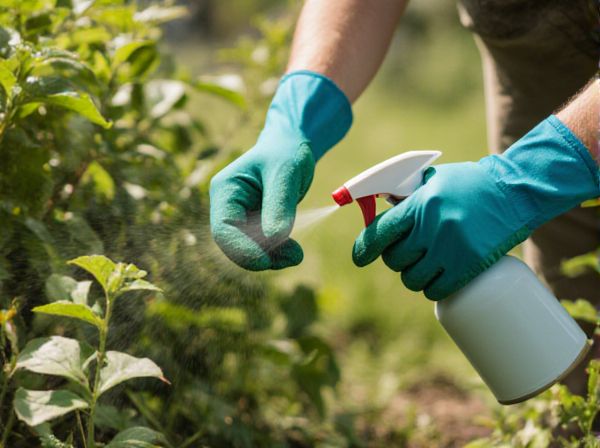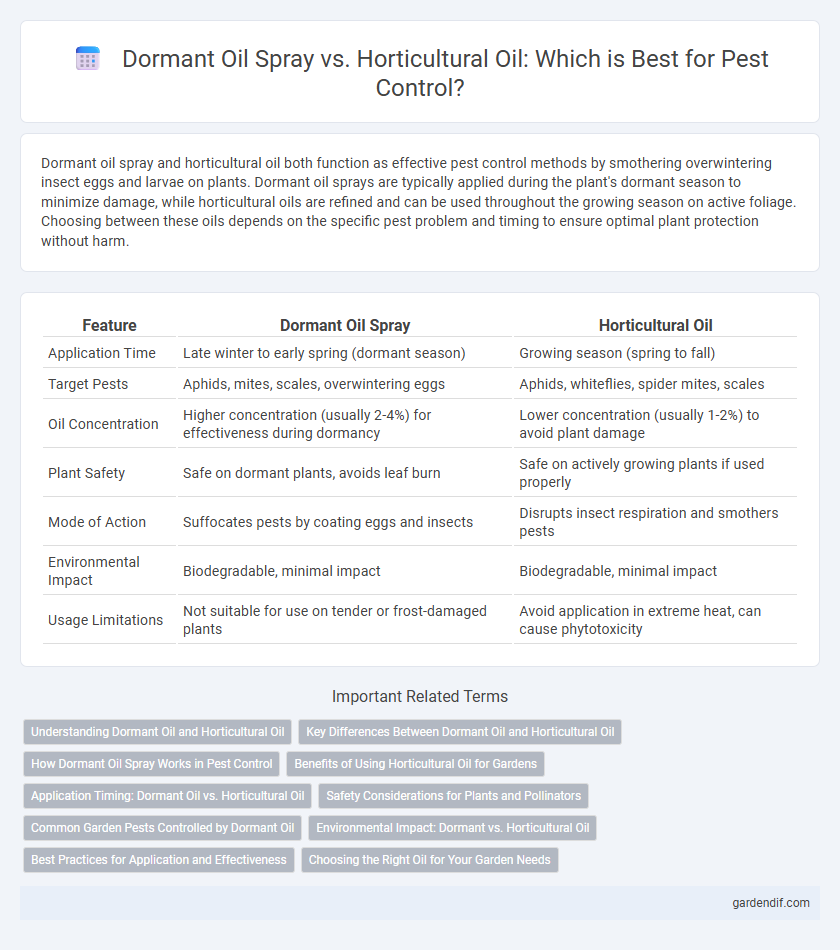
Dormant oil spray vs horticultural oil Illustration
Dormant oil spray and horticultural oil both function as effective pest control methods by smothering overwintering insect eggs and larvae on plants. Dormant oil sprays are typically applied during the plant's dormant season to minimize damage, while horticultural oils are refined and can be used throughout the growing season on active foliage. Choosing between these oils depends on the specific pest problem and timing to ensure optimal plant protection without harm.
Table of Comparison
| Feature | Dormant Oil Spray | Horticultural Oil |
|---|---|---|
| Application Time | Late winter to early spring (dormant season) | Growing season (spring to fall) |
| Target Pests | Aphids, mites, scales, overwintering eggs | Aphids, whiteflies, spider mites, scales |
| Oil Concentration | Higher concentration (usually 2-4%) for effectiveness during dormancy | Lower concentration (usually 1-2%) to avoid plant damage |
| Plant Safety | Safe on dormant plants, avoids leaf burn | Safe on actively growing plants if used properly |
| Mode of Action | Suffocates pests by coating eggs and insects | Disrupts insect respiration and smothers pests |
| Environmental Impact | Biodegradable, minimal impact | Biodegradable, minimal impact |
| Usage Limitations | Not suitable for use on tender or frost-damaged plants | Avoid application in extreme heat, can cause phytotoxicity |
Understanding Dormant Oil and Horticultural Oil
Dormant oil spray is a refined petroleum-based product applied during the plant's dormant season to suffocate overwintering insect eggs and pests, improving pest control on fruit trees and shrubs. Horticultural oil, derived from highly refined petroleum or vegetable oils, is used during the growing season to target soft-bodied insects like aphids and mites by disrupting their cell membranes. Both oils act as contact insecticides but vary in formulation, timing of application, and specific pest control benefits, making it essential to select the appropriate oil based on the pest lifecycle and plant stage.
Key Differences Between Dormant Oil and Horticultural Oil
Dormant oil spray is a highly refined petroleum-based oil applied during the plant's dormant season to suffocate overwintering pests and eggs, while horticultural oil is a lighter, more refined oil used during active growing periods to control a broader range of insect pests and mites. Dormant oils have a higher viscosity and are designed to avoid phytotoxicity on leafless plants, whereas horticultural oils are formulated to minimize damage on tender foliage and blooms. The timing, formulation, and target pests distinguish dormant oil from horticultural oil in integrated pest management practices.
How Dormant Oil Spray Works in Pest Control
Dormant oil spray works by suffocating overwintering pest eggs and larvae, disrupting their respiration and preventing hatch. This oil forms a protective layer on plant surfaces, effectively targeting scale insects, aphids, and mites before they become active. By coating pests during their dormant stage, it reduces infestations without harming beneficial insects active later in the season.
Benefits of Using Horticultural Oil for Gardens
Horticultural oil effectively controls a wide range of garden pests such as aphids, spider mites, and whiteflies by suffocating eggs and larvae without harming beneficial insects. Its refined formulation ensures plant safety, reducing the risk of leaf burn even in warmer conditions compared to dormant oil spray. Regular use of horticultural oil promotes healthier plant growth and minimizes the need for synthetic chemical pesticides, supporting sustainable gardening practices.
Application Timing: Dormant Oil vs. Horticultural Oil
Dormant oil spray is applied during the late fall and early spring when plants are leafless to effectively smother overwintering pest eggs and larvae. Horticultural oil is used during the growing season, targeting active pests on leaves, stems, and fruit without damaging the foliage. Precise timing ensures maximum pest control while minimizing plant stress and oil phytotoxicity.
Safety Considerations for Plants and Pollinators
Dormant oil spray, typically applied during the dormant season, poses minimal risk to pollinators due to its timing but requires caution to avoid plant damage from over-application or application during warm weather. Horticultural oil, used throughout the growing season, contains refined petroleum oils that are safer for plants when applied correctly but can harm pollinators if sprayed directly on blooming flowers. Both oils demand adherence to label instructions regarding temperature, timing, and exposure to ensure plant health and pollinator safety.
Common Garden Pests Controlled by Dormant Oil
Dormant oil spray effectively controls common garden pests such as aphids, scale insects, mites, and whiteflies by suffocating overwintering eggs and larvae. Unlike horticultural oil, which is typically used during the growing season for direct pest contact, dormant oil targets pests in their inactive stage, reducing populations before they become active in spring. Applying dormant oil in late winter or early spring helps prevent infestations and promotes healthier plant growth.
Environmental Impact: Dormant vs. Horticultural Oil
Dormant oil spray, typically applied during late fall or winter, is formulated to be less toxic and degrade more rapidly, minimizing environmental persistence and reducing harm to beneficial insects. In contrast, horticultural oil, used mainly in growing seasons, may contain refined petroleum compounds that persist longer in the environment and require careful application to avoid non-target effects. Both oils, when used correctly, support integrated pest management by providing targeted pest control with reduced ecological impact compared to synthetic pesticides.
Best Practices for Application and Effectiveness
Dormant oil spray is highly effective for controlling overwintering pests by suffocating their eggs and larvae, best applied during late winter when trees are still inactive to avoid phytotoxicity. Horticultural oil, a refined version designed for use during the growing season, targets soft-bodied insects and mites with minimal damage to foliage, requiring thorough coverage for optimal results. For best practices, ensure temperatures are above 40degF, avoid application during bloom to protect pollinators, and thoroughly cover all plant surfaces to maximize pest control efficacy.
Choosing the Right Oil for Your Garden Needs
Dormant oil spray, designed for application during plant dormancy, effectively controls overwintering pests by smothering eggs and larvae on trees and shrubs. Horticultural oil, a refined and lightweight option, suits active growing seasons by targeting soft-bodied insects without harming delicate foliage. Selecting the right oil depends on timing, pest type, and plant sensitivity to ensure optimal garden pest management.
Dormant oil spray vs horticultural oil Infographic

 gardendif.com
gardendif.com